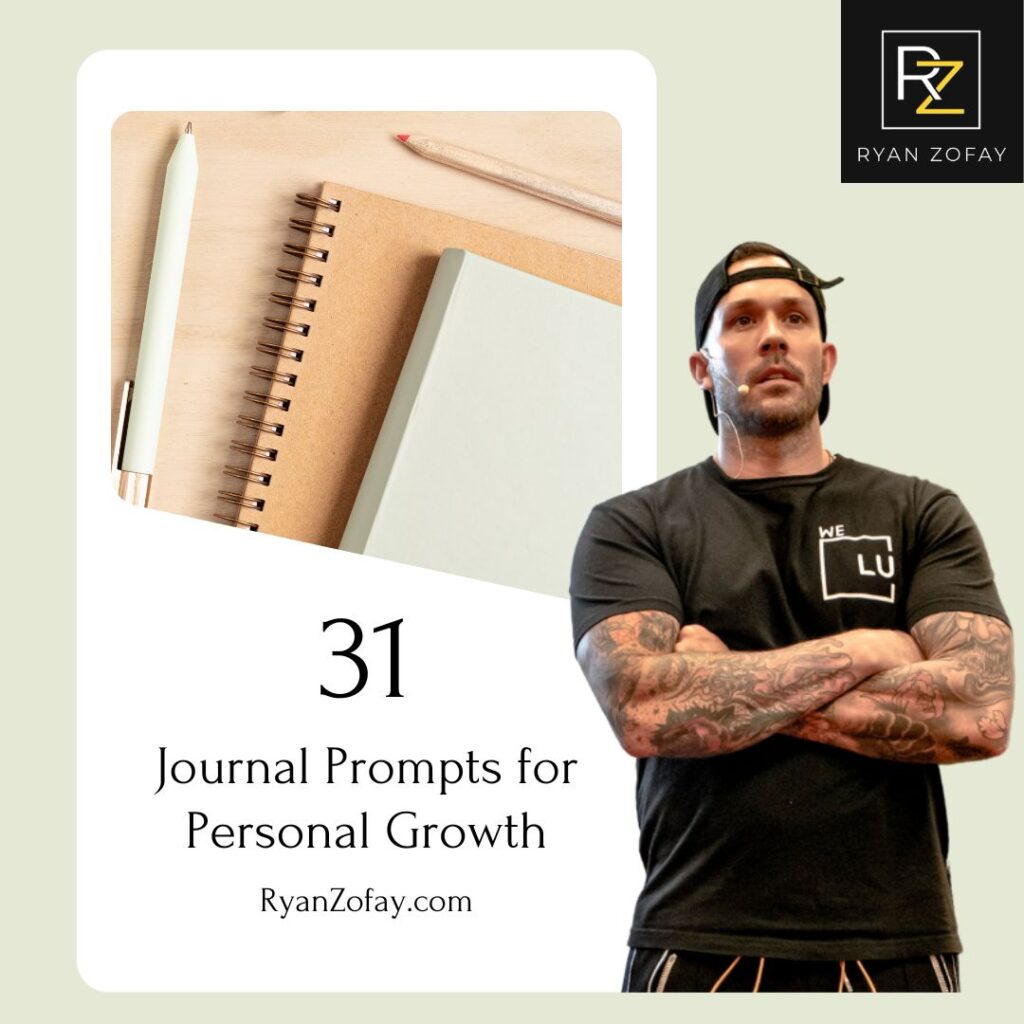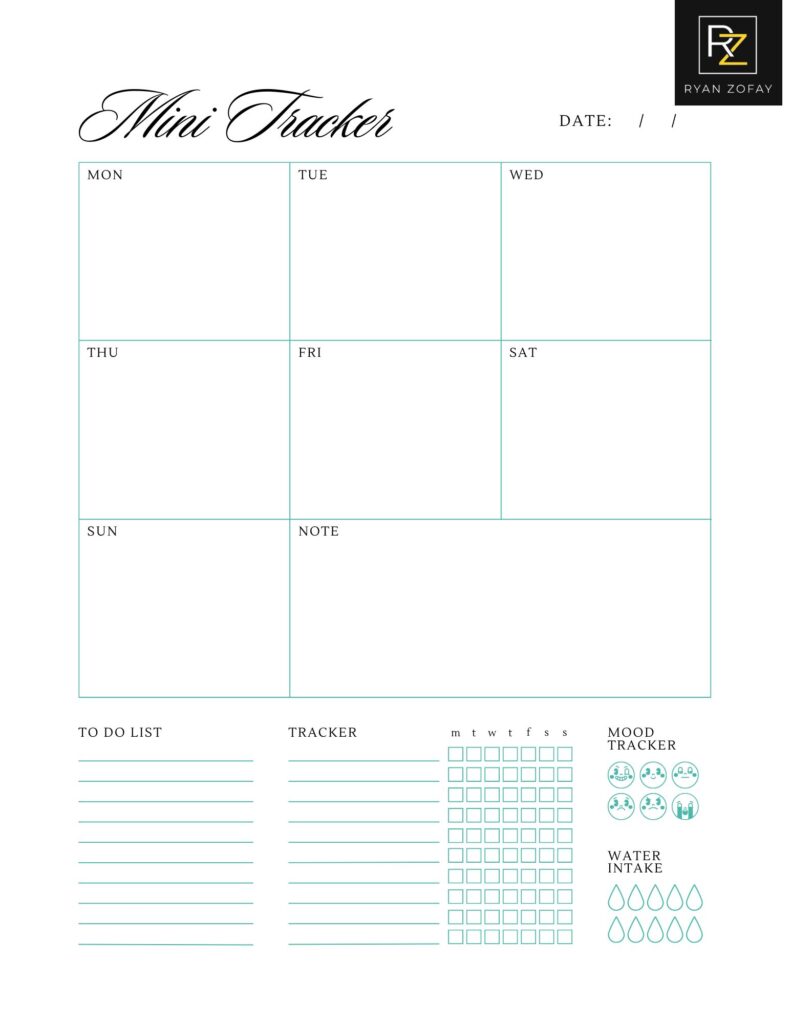A Thought Journal Before Bed Changed My Life—and It Can Change Yours Too
Have you ever felt trapped by your thoughts, unable to quiet the noise before bed? I used to lie awake, held captive by a whirlwind of worries, self-doubt, and unresolved emotions. But then, I discovered the power of keeping a thought journal before bed, completely transforming my life.
My name is Ryan Zofay, and my path hasn’t always been straightforward. Growing up in a tumultuous environment, feeling abandoned as a child, battling addiction, and overcoming trauma were the early chapters of my childhood. But I’ve turned my life around through resilience, growth mindset shifts, and adopting an attitude of gratitude with thought journaling. Today, I’m 22 years sober, a founder of We Level Up, a 9-figure organization with about a 600-member team. I’m committed to helping others unlock their potential through their thought journal before bed practice.
This straightforward habit, a positive thought journal before bed, remains a cornerstone of my success and healing. Thought journaling before bed is not just dedicating 5 minutes with a notebook and pen; it’s a powerful technique that has taught me gratitude, calmed my anxiety, improved my emotional state, and even helped me sleep better. If you’re ready to master your emotions, take control of your thoughts, and journal for personal growth, this guide will show you how to start a thought journal before bed in 6 steps. And why a thought journal could be the game-changer you’ve been searching for.
My Transformative Journey: Homeless to Success Using Tools like a Positive Thought Journal Before Bed
My Journey to Resilience: First-Person Account with Thought Journaling before bed
My journey from homelessness to success is a testament to the power of mindset and personal growth. My life story of drug dependence at an early age to sobriety and professional success illustrates the power of mindset and personal growth. One of the most impactful tools I discovered was keeping a positive thought journal before bed.
The Power of Thought Journaling
In my darkest moments, when I was struggling with addiction and facing seemingly insurmountable challenges, I began exploring thought journaling CBT techniques. This practice of journaling and thought records in CBT therapy became a lifeline, helping me reframe negative deep rooted beliefs to cultivate a positive outlook. By consistently engaging in journaling and thought records in CBT, I was able to identify and challenge the destructive self limiting beliefs that had held me back for so long.
Benefits of journaling your thoughts
I discovered that the benefits of journaling your thoughts are profound and far-reaching. Maintaining a daily thoughts journal provided clarity, reduced anxiety, and helped me focus on solutions rather than problems. It became a powerful tool for processing emotions and setting meaningful goals.
How do I journal my thoughts?
When it comes to journaling thoughts, I recommend starting simple. I use multiple journals for different purposes – a yellow journal for morning brain dumps, a brown Monk Journal for daily reflections, and a red journal for processing intense emotions.
Key Strategies for Thought Journaling
- Choose a journal that feels comfortable and inviting
- Set aside 5-10 minutes daily for writing
- Don’t censor yourself – let thoughts flow freely
- Use prompts if you’re feeling stuck
- Focus on honesty and self-reflection
Journaling and Thought Records in CBT
By consistently engaging in journaling and thought records in CBT, I was able to identify and challenge the destructive beliefs that had held me back for so long. This process of self-reflection became a crucial part of my recovery and personal development.
From Negative to Positive
Learning how to journal negative thoughts was a game-changer. By acknowledging deep thought journal prompts on paper, I could examine them objectively and transform them into more constructive narratives. This practice gradually shifted my mindset from one of despair to one of hope and possibility.
Today, as a successful entrepreneur and motivational speaker, I continue to use thoughtful journal prompts to maintain my mental clarity and drive personal growth. My journey from homelessness to helping found a 9-figure multi-million dollar company proves that transformation is possible for anyone with the right tools and mindset.
For more information and resources on personal development through a thought journal, visit:
- Benefits of Journaling for Self-Growth
- Personal Development Plan Layout Template
- Best 21 Self-Improver Transformational Success Strategies
- Free Tracker for Journaling Printables
- Journaling for Emotional Healing
- The Power of Reflective Journaling in Personal Growth
- Journaling Techniques for Stress Management
- Using Journaling to Set and Achieve Goals
- Mindfulness and Journaling: A Powerful Combination
- Journaling for Self-Discovery: Uncovering Your True Potential
Jump To
Table of Contents

The Benefits of a Thought Journal Before Bed
As a life coach passionate about personal growth and making meaningful change. One of the most effective tools I’ve discovered on this journey is keeping a thought journal before bed. You might be familiar with techniques like journaling and thought records in CBT (Cognitive Behavioral Therapy)—they’re incredibly powerful, and consistently applying them has been a game-changer for me and many others.
Taking five to ten minutes at night to jot down your thoughts can significantly impact your emotional and mental well-being. Read on or leap to the top 10 benefits of journaling your thoughts.
What Is a Thought Journal?
A thought journal is a tool for reflecting on your day by jotting down thoughts, emotions, and experiences. It can be an outlet for unspoken emotions, a space for processing challenges, and a guide to better understanding yourself.
Using a thought journal before bed sets the stage for restful sleep by clearing your mental clutter and focusing on positivity. Unlike traditional journaling, thought journaling often incorporates prompts to help you dig deep into your mindset, emotions, and aspirations.

This simple yet profound activity has its roots in practices like Cognitive Behavioral Therapy (CBT). Tools like “thought journaling CBT” or “thought journal therapist aids” are strategically crafted to help address and reframe negative thought patterns. Applying these techniques before bed ensures you’re not surrendering to your worries at night but actively reshaping them into constructive growth.
Top 10 benefits of journaling your thoughts
Why take five to ten minutes at night to jot down your thoughts? The advantage of a positive thought journal before bed might surprise you. Here are the top 10 benefits I’ve personally experienced from keeping a thought journal before bed:
1. Reduces Anxiety and Stress
Unloading the mental baggage before bed by writing down worries and fears creates clarity. Journaling provides a platform to unravel intrusive or negative thoughts by articulating them—and often, you’ll start seeing solutions. This simple practice mimics techniques used in CBT, where you can identify and replace self-defeating thoughts with constructive ones.
2. Promotes Better Sleep
Are you struggling with racing thoughts or intrusive thoughts at night? A thought journal acts as a release, allowing you to let go of negative emotions and replace them with positive reflections. Once your mind is clearer, you improve your chances of getting a peaceful night’s rest, feeling refreshed and ready to take on the next day.
By cleansing your negative thoughts with positive reflections, you can set your mind up to relax. This is particularly useful for those with trouble sleeping due to constant thinking.
3. Improves Emotional Regulation
Consistent journaling creates space to recognize emotional triggers and patterns in your daily life. Once identified, it’s easier to work on healthier emotional reactions. It’s a reflective process that builds emotional strength, improving how I and others I coach respond to challenges over time.
4. Boosts Gratitude
Gratitude journaling—a common form of thought journaling—involves listing things you’re thankful for. When practiced daily, this fosters a more optimistic outlook and increases resilience.
Practicing gratitude through journaling has been a turning point for cultivating optimism in my life. Listing a few things you’re thankful for daily shifts your focus to positive experiences, fostering a resilient and deeply rewarding mindset.
5. Enhances Self-Awareness
Journaling your thoughts helps you reflect on your habits, decisions, and reactions. Understanding your mind better equips you to make informed choices in the future.
Ever wonder, “How do you journal your thoughts in an impactful way?” I often encourage clients to reflect on their daily habits, reactions, and decisions in their journals. This practice offers a clearer understanding of who you are and what drives your behaviors. With greater self-awareness, you can make more informed decisions towards achieving your goals.
6. Encourages Personal Growth
Journaling provides a space for setting intentions and holding yourself accountable. Whether recovering from addiction, managing anxiety, or pursuing self-improvement, a thought journal is your daily guide.
A thought journal isn’t just a place to vent—it’s a tool for growth. Use it to set intentions, track progress, and hold yourself accountable. I’ve personally experienced all of these changes.
Journaling isn’t about writing perfectly—it’s about showing up for yourself. Scribbling down messy thoughts has led me to breakthrough moments I never expected.
7. Strengthens Problem-Solving Skills
Writing down your thoughts can help you see challenges from a new perspective. Journaling helps you break down problems into smaller, manageable parts, making it easier to identify solutions. Over time, this practice sharpens your problem-solving skills and builds confidence in your ability to handle life’s obstacles.
8. Tracks Progress and Achievements
A thought journal is a powerful tool for tracking personal and professional growth. You create a tangible record of your progress by regularly documenting your thoughts, goals, and accomplishments. This boosts motivation and helps you celebrate your wins, no matter how small.
9. Fosters Creativity and Clarity
Writing down your thoughts before bed can unlock creativity and provide clarity. As you release the day’s mental clutter, you create space for new ideas and insights. Many of my most creative breakthroughs have come from late-night journaling sessions.
10. Builds Resilience and Mental Strength
Journaling helps you process difficult emotions and experiences, building resilience. By consistently reflecting on your thoughts and feelings, you develop the strength to navigate challenges gracefully and confidently.
How to Start a Thought Journal Before Bed in 6 Steps
Starting a thought journal may feel intimidating, but it’s simpler than you think. Here’s how I suggest how to journal thoughts and feelings:
1. Choose Your Tools
- Notebook vs. App: Whether you enjoy the tactile nature of pen and paper or prefer a journaling app, choose what feels natural.
- Keep It Accessible: Place your journal near your bed so you never forget.
2. Use Thoughtful Journal Prompts
Prompts will guide you, especially when you don’t know what to write. Here are a few of my go-to prompts:
- What made me feel grateful today?
- What’s one challenge I faced, and how did I handle it?
- What’s a negative thought I can reframe into a positive one?
3. Reflect on Your Day
Before you sleep, write down a quick summary of your day:
- Highlight the wins, both small and big.
- Acknowledge the setbacks without judgment.
4. Express Gratitude
Gratitude journaling is the secret sauce to rewiring your brain for positivity. Write down 2–3 things you’re grateful for, no matter how small.
5. Reframe Negative Thoughts
Using techniques from thought journaling CBT will help you challenge and replace unproductive thoughts. For example:
- Negative Thought: “I’ll never get this project done.”
- Reframe It To: “I didn’t make as much progress today, but I’ll dedicate time tomorrow and make a plan.”
6. End on a Positive Note
Write one affirmation about yourself as a final thought. Example affirmations:
- “I am capable of overcoming tough situations.”
- “I am grateful for the lessons today taught me.”
Stick with this habit for at least 30 days, and you’ll start noticing profound changes.
Watch my videos on the power of a thought journal before bed here:
Related Resources:
- Download my free thought journal printables templates.
- Read my blog on overcoming adversity and self-doubt here.
- Explore my top tips and affirmations for building resilience.
- Grasp emotional intelligence 2.0 strategies and tips and learn how to master your emotions.
- Best Ever 365 Gratitude Journal Prompts. Daily 5 Minute Gratitude Journal Questions.
Your thought journal is more than just a notebook—it’s a tool for transformation. Let’s get started.

Why Journaling Works
Journaling has never been about doing it perfectly—it’s about showing up for yourself. The process is not about neat or polished writing; it’s raw, messy, and often unexpected. But that’s where breakthroughs happen. Writing my thoughts down, even when they feel scattered or unresolved, has allowed me to uncover patterns and make lasting changes in my life.
Journaling is one of the most impactful practices you can adopt if you want to tackle intrusive thoughts, work through challenges, or just end your day on a thoughtful note. Your thought journal can help you replace self-defeating thoughts with strength, clarity, and growth.
Start small—just five minutes tonight. You never know what discoveries you’ll make.
Use a mini tracker printable template for your thought journal before bed

Thoughtful Journal Prompts to Explore
Want to know how to journal negative thoughts? Are you ready to embark on your positive thought journal before bed? But you are not sure where to start? Here are some thoughtful journal prompts to inspire deeper reflections:
- What’s the most upbeat moment I experienced today?
- How can I turn today’s challenges into learning opportunities?
- What am I proud of accomplishing this week?
- How did I show compassion to myself or others today?
- What’s one goal I want to focus on tomorrow?
These prompts are designed for self-discovery, mood improvement, and emotional growth. They’ve been game-changers for me in my recovery and personal development.
Thought journal CBT best practices
As a life coach, one of the most potent tools I recommend to my clients for self-improvement is a thought journal CBT approach rooted in Cognitive Behavioral Therapy (CBT). A CBT thought journal isn’t just about scribbling down your random thoughts; it is an intentional practice designed to help you identify, challenge, and change negative or unhelpful thinking patterns.
Advantages of journaling and thought records in CBT
Through journaling and thought records in CBT, you can transform your inner dialogue, moving past mental roadblocks like self-doubt or anxiety. A CBT thought journal provides an excellent avenue for personal growth by helping you recognize patterns in your thoughts, specifically intrusive thoughts, and take actionable steps to address them. I’ve seen how impactful a nightly thought journal CBT practice can be for gaining clarity and control over emotions. Learn more about the benefits of journaling your thoughts in my growth journaling guide.
CBT thought journal template
Some may wonder, “How to organize a thought journal?” A great place to start is by using a CBT thought journal template. Templates can act as a helpful guide, ensuring you capture key elements such as the situation, your thoughts in response, the emotions you experienced, and the evidence for and against that thought. Many thought journal therapist aids are easily accessible, giving you practical resources to take your thought journaling up a notch.
For example, if you’re grappling with intrusive thoughts, a structured journal can help you track when these thoughts occur, what triggers them, and how they influence your emotions and behaviors. This reflective process fosters self-awareness and allows you to replace unhelpful thoughts with more constructive and balanced ones.
Thought journal CBT tips and strategies
Consistency is key in using a CBT thought journal template or creating your own. Dedicate time each day to reflecting and writing. Over time, I thought my positive thoughts journal would become a habit and a lifeline for managing stress and fostering resilience.
Lean into journaling thoughts before bed. Follow your daily thoughts journal process, and watch as your thought-provoking journal prompts catalyze meaningful change. Harnessing tools like a thought journal therapist aid can transform how you approach your life, relationships, and emotional well-being.
Real-Life Results of journaling and thought records in CBT
I’ll never forget how using a thought journal before bed helped me overcome moments of self-doubt early in my sobriety. Writing my feelings in a happy thoughts journal helped me confront hard truths and celebrate small wins I would have overlooked otherwise. Those five minutes for my thought journal before bed became sacred—a safe space to process my evolving identity and shift old patterns.
The results? Less anxiety. Deeper gratitude. A profound sense of control over my journey. And now, 22 years sober, I see journaling as both a therapy tool and an invitation to grow. Many people I’ve worked with reported similar success through journaling.
If a thought journal before bed works for me—and them—it can work for you, too.
Your thought journal before bed Transformation
Journaling is a simple yet transformative practice that anyone can adopt. Whether you’re managing anxiety, recovering from addiction, or just seeking clarity, a thought journal before bed will move you closer to the life you want.
Start small. Dedicate a few minutes tonight to writing your thoughts. Use the prompts provided or reflect on your day.
If journaling feels overwhelming, reach out. I believe in equipping people with tools for success, from sobriety to self-improvement. Together, we can light your path to transformation.
The question is… Are you ready to unlock the power of your thoughts?
Resources
Citations:
Benefits of Journaling for Self-Growth
Personal Development Plan Layout Template
Best 21 Self-Improver Transformational Success Strategies
Free Tracker for Journaling Printables
Journaling for Emotional Healing
The Power of Reflective Journaling in Personal Growth
Journaling Techniques for Stress Management
Using Journaling to Set and Achieve Goals
Mindfulness and Journaling: A Powerful Combination
Journaling for Self-Discovery: Uncovering Your True Potential


